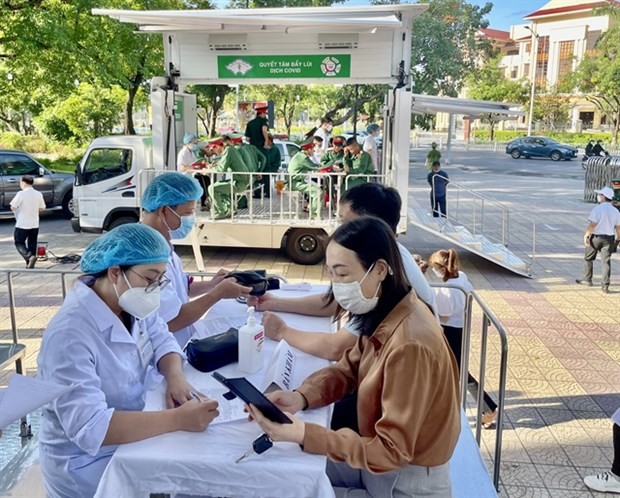 Medical workers talk to residents before Covid-19 vaccinations in the central province of Thua Thien-Hue. (Photo: VNA)
Medical workers talk to residents before Covid-19 vaccinations in the central province of Thua Thien-Hue. (Photo: VNA)
The Ministry of Health (MoH) reported nearly 1,300 new cases of Covid-19 on Thursday, an increase of 100 cases from the day before. The new cases were mainly due to the BA.4 and BA.5 variants of the Omicron strain.
Associate professor Tran Dac Phu, former director of the General Department of Preventive Medicine under the MoH, said that the easing of anti-pandemic measures and neglect of preventive measures were behind the increase.
“People do not wear masks and do not take preventive measures, even in high-risk areas. Those with symptoms also do not quarantine, do not make a medical declaration, and do not get tested, so they do not know if they have Covid-19 or not,” said Phu.
He added that the number of new cases was not exact, because testing was no longer carried out, so asymptomatic cases were not included in the total.
Phu believes it is important to protect people at high-risk, such as those with underlying diseases, the elderly, and people who have not received a full course of vaccine.
Effective protective measures are still disinfection, wearing masks in high-risk areas such as hospitals and crowded places, or avoiding contact with infected people.
It is necessary to have booster doses of the vaccine to limit the number of new cases and avoid overloading the healthcare system.
Phu said that the health sector must properly assess the risk based on the real number of infections in their managed areas. They should assess severe cases and those under treatment.
“We have loosened preventive measures but still have to ensure control,” he said.
Phu said booster jabs were crucial in preventing the disease, avoiding severe cases, preventing the health system from becoming overloaded and reducing mortality.
“We must educate people on the vaccines, especially the elderly and people with underlying diseases," said Phu.
Vietnam still has 21.5 million doses of Covid-19 vaccine in stock, mainly Pfizer and Moderna vaccines, said Duong Thi Hong, deputy director of the National Institute of Hygiene and Epidemiology.
The rate of booster doses for children over 12 had not reached the plan, she said. And the rate of basic doses for children between five and under 12 years old was also the same.
Associate professor Tran Dac Phu, former director of the General Department of Preventive Medicine under the MoH, said that the easing of anti-pandemic measures and neglect of preventive measures were behind the increase.
“People do not wear masks and do not take preventive measures, even in high-risk areas. Those with symptoms also do not quarantine, do not make a medical declaration, and do not get tested, so they do not know if they have Covid-19 or not,” said Phu.
He added that the number of new cases was not exact, because testing was no longer carried out, so asymptomatic cases were not included in the total.
Phu believes it is important to protect people at high-risk, such as those with underlying diseases, the elderly, and people who have not received a full course of vaccine.
Effective protective measures are still disinfection, wearing masks in high-risk areas such as hospitals and crowded places, or avoiding contact with infected people.
It is necessary to have booster doses of the vaccine to limit the number of new cases and avoid overloading the healthcare system.
Phu said that the health sector must properly assess the risk based on the real number of infections in their managed areas. They should assess severe cases and those under treatment.
“We have loosened preventive measures but still have to ensure control,” he said.
Phu said booster jabs were crucial in preventing the disease, avoiding severe cases, preventing the health system from becoming overloaded and reducing mortality.
“We must educate people on the vaccines, especially the elderly and people with underlying diseases," said Phu.
Vietnam still has 21.5 million doses of Covid-19 vaccine in stock, mainly Pfizer and Moderna vaccines, said Duong Thi Hong, deputy director of the National Institute of Hygiene and Epidemiology.
The rate of booster doses for children over 12 had not reached the plan, she said. And the rate of basic doses for children between five and under 12 years old was also the same.
























